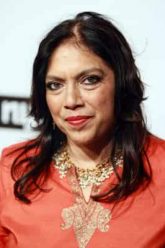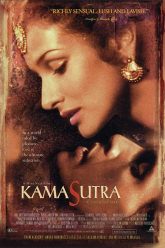Overview
Born October 15, 1957 in Bhubaneshwar, Orissa, India
Mini-Bio
Accomplished Film Director/Writer/Producer Mira Nair was born in India and educated at Delhi University and at Harvard. She began her film career as an actor and then turned to directing award-winning documentaries, including So Far From India and India Cabaret. Her debut feature film, Salaam Bombay! was nominated for an Academy Award for Best Foreign Language Film in 1988; it won the Camera D’Or (for best first feature) and the Prix du Publique (for most popular entry) at the Cannes Film Festival and 25 other international awards. Her next film, Mississippi Masala, an interracial love story set in the American South and Uganda, starring Denzel Washington and Sarita Choudhury, won three awards at the Venice Film Festival including Best Screenplay and The Audience Choice Award. Subsequent films include The Perez Family (with Marisa Tomei, Anjelica Huston, Alfred Molina and Chazz Palminteri), about an exiled Cuban family in Miami; and the sensuous Kama Sutra: A Tale of Love, which she directed and co-wrote. Nair directed My Own Country based on Dr. Abraham Verghese’s best-selling memoir about a young immigrant doctor dealing with the AIDS epidemic. Made in 1998, My Own Country starred Naveen Andrews, Glenne Headly, Marisa Tomei, Swoosie Kurtz, and Hal Holbrook, and was awarded the NAACP award for best fiction feature. Nair returned to the documentary form in August 1999 with The Laughing Club of India, which was awarded The Special Jury Prize in the Festival International de Programmes Audiovisuels 2000. In the summer of 2000, Nair shot Monsoon Wedding in 30 days, a story of a Punjabi wedding starring Naseeruddin Shah and an ensemble of Indian actors. Winner of the Golden Lion at the 2001 Venice Film Festival, Monsoon Wedding also won a Golden Globe nomination for Best Foreign Language Film and opened worldwide to tremendous critical and commercial acclaim. Nair’s next feature was an HBO original film, Hysterical Blindness. Set in working class New Jersey in 1987, the film stars Uma Thurman, Juliette Lewis, Gena Rowlands. Thurman and Lewis play single women looking for love in all the wrong places, while Rowlands, who plays Thurman’s mother, adds to her daughter’s hysteria when she finds Mr. Right in Ben Gazarra. The film received great critical acclaim and the highest ratings for HBO, garnering an audience of 15 million, a Golden Globe for Uma Thurman, and 3 Emmy Awards. Following the tragic events of September 11, 2001, Nair joined a group of 11 renowned filmmakers, each commissioned to direct a film that was 11 minutes, 9 seconds and one frame long. Nair’s film is a retelling of real events in the life of the Hamdani family in Queens, whose eldest son was missing after September 11, and was then accused by the media of being a terrorist. 11.09.01 is the true story of a mother’s search for her son who did not return home on that fateful day. In May 2003, Nair helmed the Focus Features production of the Thackeray classic, Vanity Fair, a provocative period tale set in post-colonial England, in which Reese Witherspoon plays the lead, Becky Sharp. The film is scheduled to release in Fall 2004. Nair’s upcoming projects include Tony Kushner’s Homebody/Kabul for HBO, and Hari Kunzru’s The Impressionist, and there are also plans to take Monsoon Wedding to Broadway. Mirabai Films is establishing an annual filmmaker’s laboratory, Maisha, which will be dedicated to the support of visionary screenwriters and directors in East Africa and India. The first lab, which is only for screenwriters, will be launched in August 2005 in Kampala, Uganda.
Spouse
Mahmood Mamdani (? – present) ( 1 child)
Mitch Epstein (? – ?) ( divorced)
Trade Mark
Credits are often set in an unusual typeface. End credits often feature pictograms, with the credit reel ending on a pictogram, as in Mississippi Masala and Kama Sutra.
Trivia
Aunt of Ishaan Nair
One son, Zohran, born 1991, with her Ugandan husband Mahmood Mamdani.
Her brother, Vicky Nair, is based in Delhi and is opening a street food restaurant in Gurgaon.
Was offered the job of directing Harry Potter and the Order of the Phoenix (2007).
First read William Makepeace Thackeray’s ‘Vanity Fair’ when she was 16. She would later adapt it into a film.
Lost hours of footage for ‘Monsoon Wedding’ when the negative was shipped to New York and x-rayed.
Member of the jury at the Cannes Film Festival in 1990
Head of jury at the Berlin International Film Festival in 2002
Teaching in Columbia University’s film department [October 2002]
Dedicated her film The Reluctant Fundamentalist (2012) to memory of her father Amrit Nair (1924-2012).
Personal Quotes (15)
I want to question what the outside is and who defines it. I often find those that are considered to be on the outside extremely inspiring. They are the people who see through the double standards, like the kid in Salaam Bombay and the courtesan in Kama Sutra.
What is really important to me is a sense of humour and a mischief about life. Life is just too boring otherwise.
…I know what it’s like to be in one place and dream of another. I also know what it’s like to feel that nostalgia is a fairly useless thing because it is stasis. It does not take you many places.
I would say that the audience in India is very important for me. Not for every film, of course, and certainly not for Hysterical Blindness, but for films that have come from my heart, like Salaam Bombay and Monsoon Wedding.
I was seen as an outsider in the beginning and then an object of great envy. All the national directors wanted to be international. They would come up to me and say, “If I cast Michael Caine and Sean Connery, do you think this will make it?” There was this fascination with the international that was totally wrong-headed.
I guess that would be Indian, in a way. We are used to no privacy. We are used to a lot of people in a room, sleeping on mattresses.
I like to be unabashed, which is an Indian trait, both emotionally and visually. It’s important to have a circus to play with.
I always like to reveal the fact that the emperor has no clothes. And children are best at that. They teach us how to see the world in that sense. They are without artifice; they see it for what it is. I am drawn to that ruthless honesty.
I grew up in a very small town which is remote even by Indian standards. I always dreamed of the world.
But if I have an obsession at all, it is with hands. I love hands and I love lips. I never cast lipless actors. So Kenneth Branagh, no thank you. It’s a weird thing but I do have these two obsessions.
People ask me this, but I’ve never sought to be on an A-list. I’ve done my own thing and my own thing has thankfully now brought me an audience.
They say now in America that final cut doesn’t mean anything. As Harvey Weinstein said to some film-maker, ‘You can have final cut. I’ll open your film in Arkansas.’
I am an independent film-maker first and foremost. I have always cut my own cloth.
My father was educated in Lahore, before the partition of India. When I went there in 2004, I was dazzled by the ocean of familiarity – in terms of music, culture and food – but even more by the largeness of spirit of the people there. We are hardly ever given anything but bad news about Pakistan, and I want people to know that it has much more than one face.
‘The Reluctant Fundamentalist’ is an exercise in personal healing and reconnection. There are elements of my own family and me that have felt impacted by the events of the past decade. The film is an attempt, among other things, to knit the pieces back together. Not by denying the tensions that have appeared, but by illustrating the ways in which we can navigate them and be human despite them.


